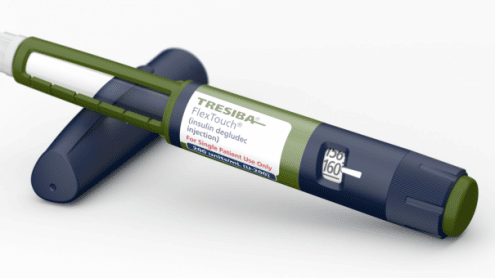Tresiba is a common brand of insulin used to treat to Type 1 and Type 2 diabetes. The active ingredient is insulin degludec, which is a long-acting drug that lasts for approximately 24 hours.
Like any other drug, there are some side effects of Tresiba. While some are common, others are very rare. If you have a serious adverse reaction, visit the nearest hospital.
Tresiba Side Effects
Common side effects
- Hypoglycemia
- Diarrhea
- Running nose
- Headaches
- Abdominal pain
- Xerostomia (dry mouth)
- Body pains
- Allergic reactions
- Sore throat
- Fevers
- Chills
- Lipodystrophy (at injection site)
- Peripheral edema
Uncommon side effects
- Abnormal and rapid weight gain
- Weight loss
- Prickling sensation of hands and feet
- Unusual swelling around the face
Rare side effects
- Dysphagia (difficulty in swallowing)
- Anxiety
- Nausea
- Dizziness
- Cool and pale skin
- Tachycardia
- Bradycardia
- Urticaria
- Rashes on the skin
- Muscular cramps
- Peripheral neuropathy (numbness of the fingers)
- Speech disorders
- Polydipsia (excess thirst)
- Polyuria (excess urination)
- Confusion
- Loss of appetite
- Seizures
- Weakness
- Blurred vision
- Immunogenicity (development of antibodies against Tresiba)
Some Tresiba side effects, such as hypoglycemia, do not always require medical attention. Fruit juice, candy, or a carbohydrate tablet will often reverse this condition.
Other side effects, such as anaphylactic shock, which is an allergic reaction, require immediate medical attention and can be life-threatening.
Like most diabetes medications, Tresiba is linked to a range of side effects. While some are not serious, others require medical assistance.
Consult your doctor immediately if you have any severe or adverse reactions. Always monitor your blood glucose levels and do not avoid or skip meals, as this may result in hypoglycemia.


